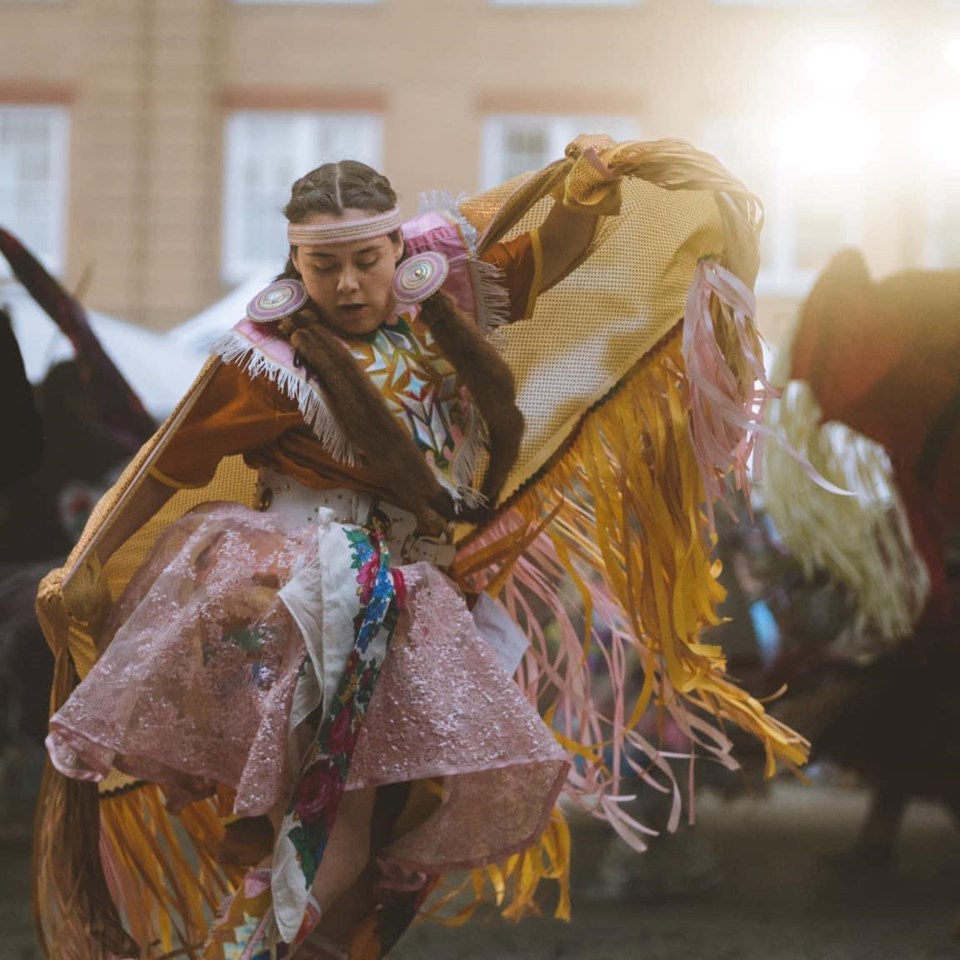Marcella Sunshine will always remember her first powwow experience.
It was a last-minute trip to Mount Currie in June 2022.
“I did not know a single person, and I went there after presenting at a conference in Vancouver. I remember showing up, tired out of my mind and hoping to find a hotel or some place to sleep after the powwow,” Sunshine recalled.
“I was actually at the start of my journey reconnecting to my culture,” she said. “I didn’t know the proper protocol or anything. I spent about an hour watching this beautiful powwow take place until I couldn’t handle being awake anymore. I went to the MC Chris Wells and asked him if he knew anywhere to stay nearby.”
The name Wild Rose Wallace was immediately exclaimed into the mic. Thankfully, this kind lady had spare rooms for visitors.
“I actually remember debating if I should take off before anyone found me,” said Sunshine. “I turned to the crowd of people dancing in an intertribal and a woman came running out of it. She shook my hand and said she was Wild Rose Wallace. Wild Rose took me, fed me, and shared stories of her community with me. She led with kindness, selflessness and bluntness. But, I love blunt people.”
Growing up in foster care, Sunshine felt lost. The fancy shawl dancer, originally from the Fishing Lake First Nation, always felt as if something was missing, and knew she was meant to be part of a bigger family. She found it through powwows.
Wallace shared five life lessons with the young lady: Be impeccable with your words; do not take anything personally; always do your best; do not make assumptions; and be skeptical, but learn to listen.
Sunshine was sent home with new books, funny socks, canned juices and an invitation to come back and visit Wallace any time. This year, she returned to the Lil’wat Nation’s Indigenous Strong Powwow, welcomed by her former host and the entire community.
The experience had a lasting effect on Sunshine, who now serves as the main coordinator for the Reclaiming Youth Powwow in Mission located on the historical grounds of the St. Mary’s Residential School.
She also coordinates a group called VYPER (Visionary Youth Peers for Equity and Revitalization). The group of young people help to foster the revitalization and adaptation of Indigenous culture for all First Nations people in B.C.
“We are funded by the Public Health Agency of Canada and focus on cultural revitalization projects across B.C.,” said Sunshine. “Every aspect of our project is ran by Indigenous youth for the communities—from the grant writing, to the project implementation, all the way to our leadership board. I can confidently say, Lil’wat Celebration Powwow opened my eyes to how necessary this work is.”
Being accepted and welcomed into a powwow was a moment Sunshine will never forget.
“Powwow has always felt like a step out of the Western world for me. It’s very important I have places to connect and heal with my people across Turtle Island,” she said. “I grew up in the foster system ... so being accepted as family into such a big unit of people has been life-changing for me.
“When I was younger, I’d go on walks and cry a lot, telling myself I was meant to have a bigger family, more people to look after me and likewise. I’m happy to say I’ve found that in my powwow world and I follow the spirit in the trail with complete trust.”
The young woman quickly volunteered when it was time to help the community that had welcomed her with open arms. Her highlight of the weekend was being able to see the youth dancing with pride.
“Indigenous people have had their inherent rights to cultural knowledge, traditions and language stripped from them by the federal government,” she said. “This has been happening for hundreds of years. We have thousands of years of ancestors who survived for our existence today. We have no other option than to learn about their messages to us and the work we need to do.”
But passing on what she knows to the younger generation is Sunshine’s ultimate goal. “It is vital that young people learn about the long-standing vision that Western society has been trying to implement since settler arrival—’To kill the Indian in the child,’” she said. “We cannot be killed, and we cannot be quieted, because we have thousands of years of generational coding for our survival as First Nations, Metis and Inuit people.”
It is paramount all youth learn their full history in order to move forward, Sunshine added.
“There are many Canadian institutions in place today that still encourage cultural genocide,” she said. “The only way we can ensure the next generation see that is by having true Indigenous knowledge and history taught to all youth (Indigenous or non-Indigenous). Knowledge on settler arrival, the doctrine of discovery, the inadequate understanding of signed documents and the Indian Act, and most importantly, every First Nation community’s inherent right to self-governance. This is why we run VYPER.”




